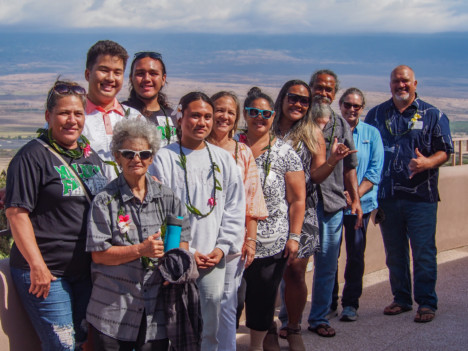Seeding for Success
While Molokai is home of the Molokai High Farmers, many agricultural farmers here continue to navigate challenges with small-scale food production from access to equipment to the cost of shipping.
“I don’t think [farming] is easy,” said Jorgen Busby, a Molokai kalo farmer and member of Molokai’s chapter of the Hawaii Farmers Union United (HFUU). “I think it’s a hard thing, but maybe we can get more people passionate about doing it.”
After retiring as a firefighter, Busby turned to small scale agriculture on his family’s lands.
“Instead of buying it, grow it yourself,” Busby encouraged. “It’s doable.”
To celebrate and support its farmers, Molokai’s chapter of the HFUU made the trip over to Maui for a special conference in honor of National Farmers Day.
“We are here today to listen to the farmers,” explained Kai Pelayo, a representative from Maui Business Brainstormers who hosted the event. Along with members from every chapter of the HFUU were representatives from the U.S. Dept. of Agriculture and Dept. of Health along with the state congress and more.
“We have to support our generational farms,” said Kilia Purdy-Avelino, vice president of Molokai’s chapter of the HFUU at the conference. “We need to make farming more ono again.”
For Purdy-Avelino, who is a generational farmer in Ho’olehua, small scale agriculture can be a key to success for Molokai’s youth.
“For many of us in Ho’olehua and other homestead areas on Molokai, there’s always the fear that a place like Molokai is so rural that our keiki will never come back,” she explained.
Now though, with more emphasis on these local farming operations, “there’s hope that there’s a next generation after us that will continue the legacy that my kupuna started,” she said.
And while interest in farming has gained momentum on Molokai post-COVID pandemic, the challenges for such an endeavor continue to be an obstacle for many small farming operations.
For instance, the Molokai Irrigation System, which supplies water for thousands of acres of homesteads and farms, proposed a 122 percent rate increase last year.
“Our homesteaders, we have our Molokai Irrigation System that was created basically for Hawaiian homesteaders, and we were given two-thirds rights [to the water], but we don’t have that,” said Purdy-Avelino. “Our bigger corporations are using most of the water and serve on most of the seats on that commission.”
Creating an interest in a career in farming is one of the key goals for high school programs like Future Farmers of America (FFA). The Molokai High School FFA club was able to make the trip to the Maui conference to hear more about statewide agricultural efforts.
“The hardest thing is getting the kids involved. It’s a big challenge,” explained Kelly Rawlins, who teaches Ag Business at Molokai High School. To continue attracting students, Rawlins has expanded the school’s farm, adding ducks and chickens.
Sheldon Hamakua, also a Molokai kalo farmer, explained that the hard work of cultivating agriculture pays off.
“Just trying to encourage your kids to participate is hard,” he said. “It’s not a glamorous job…but let’s make farming healthy. Health is wealth.”












Don't have a Molokai Dispatch ID?
Sign up is easy. Sign up now
You must login to post a comment.
Lost Password